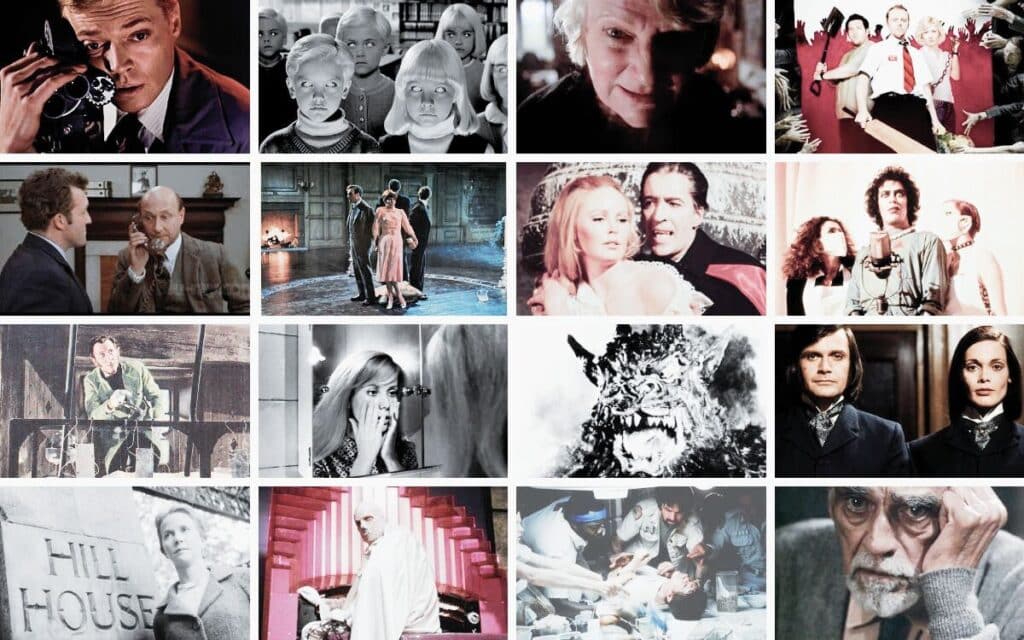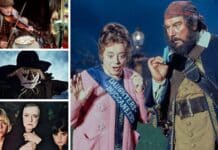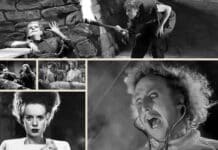Spooky Isles, with the help of its editors, writers and horror expert/enthusiasts, has crafted a chilling list of the top 50 British horror films, showcasing decades of eerie cinematic masterpieces

Top British Horror Films of All Time
Forgive us for sounding like a scripted announcer at an televised awards ceremony, but horror films are like a deep dive into the unknown, revealing our deepest fears and anxieties in a way that’s both thrilling and thought-provoking.
British horror, with its unique blend of traditional gothic elements and innovative storytelling, takes this exploration to new level.
To truly celebrate this genre, Spooky Isles has asked 13 aficionados – film scholars, writers and hardcore fans – to compile a definitive list of the top 50 British horror films.
This selection spans the full spectrum of horror, from supernatural chills to the kind of visceral terror that sticks with you long after the credits roll.
Our curated list is a journey through the dark heart of horror, showcasing films that have redefined the genre.
We stagger the eerie, abandoned landscapes of 28 Days Later, wander the haunted halls of The Innocents, and venture into the claustrophobic nightmare of Alien, where horror meets sci-fi in the most unsettling ways. Films like An American Werewolf in London blend scares with dark humour, while Blood on Satan’s Claw and The Wicker Man delve into folk horror, challenging societal norms under the guise of rural terror.
From groundbreaking anthologies like Dead of Night to the psychological tension of Don’t Look Now, each film not only delivers scares but also invites reflection, analysis, and appreciation for the craft of horror filmmaking.
Whether you’re drawn to tales of the supernatural, the psychological, or the downright macabre, this collection offers a broad view of the films that have shaped British horror, inviting both fear and fascination in equal measure.
Let’s embark on this chilling journey together, uncovering the artistry and impact of British horror.
Our Experts
Thank you to those people who have helped us put together this list.
They were, in alphabetical order:
- Ann Massey McElroy is Spooky Isles Deputy Editor and Ireland Editor, and Ireland-based paranormal investigator, writer and folklore expert.
- Barry McCann is a Lancashire-based writer, speaker, performer and broadcaster with a special fascination for horror and folklore.
- David Saunderson is the founder and editor of Spooky Isles.
- Emma Dark is an award-winning filmmaker, and actress working within the Horror, Sci-Fi and Fantasy genres.
- Lauren Jane Barnett is a horror writer, podcaster and indie horror actress best known for Death Lines: Walking London’s Horror History.
- Peter Fuller is an award-winning cult film blogger, author and curator of Vincent Price Legacy UK.
- Richard Markworth is a writer and filmmaker who has been obsessed with horror and monsters, in all their fictional forms since childhood.
- Richard Phillips–Jones is Spooky Isles Deputy Editor and Films and TV Editor.
- Sarah Radakovic is a life-long horror film fan who has been studying her Masters in Victorian Studies at Birkbeck College.
- Selene Paxton-Brooks describes herself as a chaos fairy who lives in a crumbling Victorian Villa by the sea.
- Simon Ball is a freelance writer and Editor at Large with the Simon’s Horrible Hothouse of Horror website.
- Stephen Jacobs is an award-winning London-based horror film historian, known for Karloff: More Than A Monster..
- Terry Sherlock is a Canadian based writer and life-long fan of horror films and the literature that inspired them.
The 50 British Horror Films of All Time
These horror films are are in alphabetical order. As it was difficult, if not impossible, to rank so many fantastic films, we just asked our experts to pick their top 50 British horror films in no particular order. We then added them all up. They didn’t agree on all of them, but these are the ones that had the most votes.
- 28 Days Later (2002): This film revitalised the zombie genre with its gritty realism and haunting depiction of a post-apocalyptic Britain.
- The Abominable Dr Phibes (1971): With its unique blend of horror and dark humour, this film stands out for its inventive kills and Vincent Price’s unforgettable performance.
- Alien (1979): This masterpiece combined horror and sci-fi elements to create a claustrophobic, terrifying experience that remains influential.
- An American Werewolf in London (1981): Renowned for its groundbreaking makeup effects, this film perfectly balances horror with dark comedy.
- Blood on Satan’s Claw (1971): This film is celebrated for its eerie atmosphere and as a quintessential example of folk horror.
- Brides of Dracula (1960): Its gothic charm and seductive menace make it a standout in the Hammer Horror canon.
- Captain Kronos – Vampire Hunter (1974): This film is praised for its innovative take on vampire lore and swashbuckling style.
- Carry on Screaming! (1966): Known for its cheeky parody of horror tropes, this film delights with its wit and campy fun.
- The Company of Wolves (1984): Blending fairy tales with horror, this visually stunning film offers a deep, thematic exploration of femininity and transformation.
- The Curse of Frankenstein (1957): This film set a new standard for horror with its vivid colours, moral ambiguity, and a compelling take on the Frankenstein myth.
- The Day of the Triffids (1962): Its innovative premise and unsettling atmosphere contribute to its status as a classic post-apocalyptic narrative.
- Dead of Night (1945): A pioneering anthology film that combines eerie storytelling with a chilling conclusion, influencing countless horror anthologies.
- Death Line (1972): With its social commentary and subterranean terror, this film offers a raw, unique take on the urban horror genre.
- The Devil Rides Out (1968): Esteemed for its atmospheric tension and compelling depiction of occult practices.
- Dog Soldiers (2002): This film is lauded for its effective blend of horror and action, rejuvenating the werewolf genre with a gritty, realistic edge.
- Don’t Look Now (1973): Celebrated for its innovative editing and haunting narrative, this film masterfully explores themes of grief and premonition.
- Dr Jekyll and Sister Hyde (1971): This inventive retelling is noted for its daring gender twist and commentary on Victorian society.
- Dr Terror’s House of Horrors (1965): A seminal horror anthology that’s revered for its engaging stories and the sinister presence of Peter Cushing.
- Dracula: Prince of Darkness (1966): Christopher Lee’s iconic performance and the film’s lush production values cement its status as a Hammer classic.
- Dracula (1958): This film redefined Dracula for a new generation, with its vibrant color, sexual undertones, and Christopher Lee’s charismatic portrayal.
- Dracula Has Risen from the Grave (1968): Praised for its gothic aesthetic and compelling narrative, continuing the legacy of Hammer’s Dracula series.
- Frankenstein and the Monster from Hell (1974): This film is notable for its dark atmosphere and a nuanced portrayal of Frankenstein as a tragic figure.
- Frenzy (1972): Hitchcock’s return to Britain resulted in this gripping thriller, showcasing his mastery of suspense and psychological depth.
- Frightmare (1974): A cult classic known for its shocking plot twists and exploration of family dynamics within the horror genre.
- From Beyond the Grave (1974): This anthology impresses with its clever storytelling, moral lessons, and eerie atmosphere.
- Hands of the Ripper (1971): The Hammer film’s unique blend of historical drama and horror, alongside its tragic portrayal of Jack the Ripper’s daughter, makes it memorable.
- The Haunting (1963): Esteemed for its psychological depth and innovative use of sound, creating a palpable sense of dread without showing ghosts.
- Hellraiser (1987): Clive Barker’s imaginative vision and the introduction of the iconic Pinhead character have cemented its place in horror lore.
- The House That Dripped Blood (1971): Its engaging vignettes and star-studded cast contribute to its charm and enduring appeal.
- The Innocents (1961): This film is celebrated for its atmospheric tension and sophisticated approach to supernatural horror.
- Kiss of the Vampire (1963): Notable for its romantic and seductive take on vampire mythology, set against a gothic backdrop.
- The Legend of Hell House (1973): This film stands out for its psychological intensity and scientific approach to the haunted house genre.
- The Lodger: A Story of the London Fog (1927): Alfred Hitchcock’s early masterpiece set a precedent for suspense cinema with its Jack the Ripper-inspired story.
- The Masque of the Red Death (1964): Renowned for its striking visuals and Roger Corman’s intelligent adaptation of Poe’s story.
- Night of the Demon (1957): This film combines folklore and psychology in a gripping tale of supernatural horror.
- Night of the Eagle (1962): Known for its suspenseful plot and exploration of witchcraft in a modern setting.
- The Omen (1976): Its masterful blend of biblical prophecy and chilling horror made it an instant classic, spawning a successful franchise.
- Peeping Tom (1960): This controversial film broke ground with its exploration of voyeurism and the psychological effects of fear.
- Quatermass and the Pit (1967): Its fusion of science fiction and horror elements, along with a thought-provoking script, make it a genre-defining classic.
- The Quatermass Experiment (1955): This pioneering sci-fi horror film captivated audiences with its innovative concept and suspenseful narrative.
- Repulsion (1965): Polanski’s portrayal of mental disintegration is both disturbing and visually arresting, making it a masterpiece of psychological horror.
- The Rocky Horror Picture Show (1975): A cult classic that defies genre boundaries, celebrated for its campy humor, memorable music, and sexual liberation themes.
- Shaun of the Dead (2004): This smart, satirical take on zombie films blends humor with horror, demonstrating Edgar Wright’s innovative direction.
- The Shining (1980): Kubrick’s adaptation is notorious for its psychological depth, atmospheric tension, and unsettling ambiguity.
- The Sorcerers (1967): This film is recognised for its intriguing premise and commentary on power, control, and the exploitation of youth.
- Tales from the Crypt (1972): A cornerstone of British horror anthologies, known for its moral tales and the iconic Crypt Keeper.
- Theatre of Blood (1973): Vincent Price shines in this unique blend of horror and black comedy, where Shakespearean tragedy meets grisly revenge.
- Village of the Damned (1960): This film’s chilling portrayal of emotionless children with supernatural powers set a benchmark for the genre.
- The Wicker Man (1973): Celebrated for its haunting atmosphere and critique of societal norms, this film remains a powerful example of folk horror.
- Witchfinder General (1968): Its brutal depiction of the witch hunts and Vincent Price’s performance offer a grim, yet compelling, historical horror.
So there you have it – 50 of the greatest British horror films of all time.
What are your thoughts? Did we pick your favourites? What did we miss? Tell us in the comments section below!







